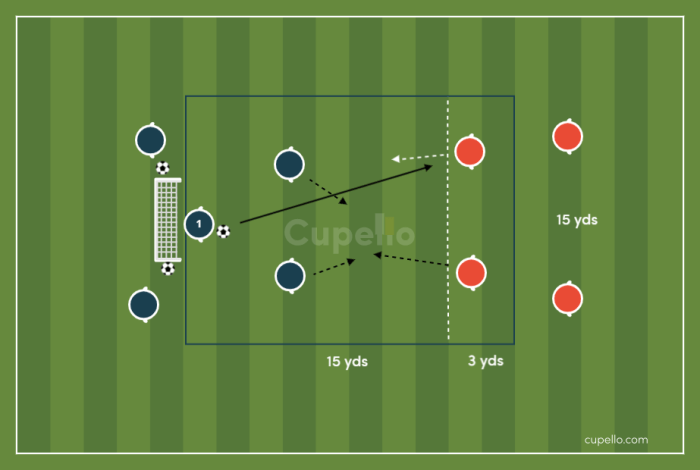Football defending drills for beginners set the stage for mastering defensive skills on the field. Get ready to dive into the world of agility, positioning, and timing with these essential drills.
Whether you’re new to the game or looking to enhance your defensive capabilities, these drills are essential for building a strong foundation.
Importance of Football Defending Drills
Practicing defending drills is crucial for beginners in football as it helps in developing essential defensive skills and techniques that are vital for success on the field.
Improved Defensive Skills
- Enhances agility and speed, allowing defenders to keep up with opponents and react quickly to changes in play.
- Improves positioning and awareness, helping defenders anticipate the movements of opposing players and intercept passes effectively.
- Builds strength and endurance, ensuring defenders can withstand physical challenges and maintain performance throughout the game.
- Enhances tackling and marking abilities, enabling defenders to dispossess opponents and prevent scoring opportunities.
Benefits of Defending Drills
- Boosts confidence and mental toughness, instilling a sense of security and control in defensive players.
- Fosters teamwork and communication, as defenders learn to coordinate with teammates to cover spaces and mark opponents.
- Reduces the risk of conceding goals, as well-drilled defenders are more likely to thwart attacks and maintain a solid defensive line.
- Prepares players for competitive matches, equipping them with the skills and mindset needed to excel in defensive roles.
Essential Skills to Focus on

To excel in football defending, beginners need to develop a set of key skills that are essential for success on the field. These skills include agility, positioning, timing, tackling, intercepting, and marking. Let’s delve deeper into each of these skills and understand their importance in defending drills.
Agility
Agility is crucial for defenders as it enables them to react quickly to the movements of the opposition players. In defending drills, players should focus on improving their footwork, change of direction, and overall quickness. Agility drills help defenders stay one step ahead of attackers and make timely interventions to regain possession.
Positioning
Proper positioning is the foundation of solid defending. Beginners should learn how to maintain the correct defensive shape, cover passing lanes, and anticipate the opponent’s next move. By honing their positioning skills in drills, defenders can effectively nullify attacking threats and minimize the chances of conceding goals.
Timing
Timing is everything in defending. Knowing when to make a tackle, intercept a pass, or mark an opponent is crucial for success. Through drills that focus on timing, beginners can sharpen their decision-making skills and execute defensive actions with precision. Good timing can disrupt the opponent’s attacking flow and create turnovers in favor of the defending team.
Tackling, Intercepting, and Marking
Tackling, intercepting, and marking are fundamental techniques that defenders must master. Tackling drills help players develop proper technique, timing, and aggression when engaging with the ball carrier. Intercepting drills focus on reading the game, anticipating passes, and making timely interceptions. Marking drills teach defenders how to stay close to their assigned opponents, track their movements, and prevent them from receiving the ball effectively.Overall, by emphasizing agility, positioning, timing, tackling, intercepting, and marking in defending drills, beginners can build a strong defensive foundation and elevate their performance on the field.
Types of Defending Drills: Football Defending Drills For Beginners
In order to improve defensive skills in football, beginners can benefit from various types of defending drills. These drills help players develop the necessary techniques and mindset to excel in defending situations.
One-on-One Defending Drills
One-on-one defending drills are essential for beginners to learn how to effectively mark an opponent and prevent them from advancing towards the goal. These drills focus on body positioning, timing of tackles, and reading the opponent’s movements. Here are some examples of drills for one-on-one defending:
- Shadowing Drill: Players practice staying close to their opponent, mirroring their movements without committing to a tackle too early.
- Tackle and Recovery Drill: Players work on making a tackle, recovering quickly if beaten, and getting back into position.
- Pressure and Delay Drill: Players learn to apply pressure on the opponent while delaying their progress, waiting for support from teammates.
Group Defending Drills
Group defending drills are crucial for beginners to understand how to work together as a defensive unit in game-like scenarios. These drills focus on communication, teamwork, and covering spaces effectively. Here are some examples of group defending drills:
- Defensive Shape Drill: Players practice maintaining a compact defensive shape, shifting as a unit to cover passing lanes and block shots.
- Transition Drill: Players simulate quick transitions from attack to defense, focusing on regaining possession and organizing defensively.
- Overload Drill: Players defend against more attackers than defenders, learning how to prioritize marking and covering dangerous areas.
Drill Progressions and Variations
Football defending drills can be modified in various ways to cater to different skill levels and keep training sessions engaging and challenging. Here are some examples of drill progressions and variations:
Progressions from Basic to Advanced, Football defending drills for beginners
- Basic: Start with simple one-on-one defending drills focusing on body positioning and timing of tackles.
- Intermediate: Progress to small-sided games where defenders have to work together to stop attacks and communicate effectively.
- Advanced: Introduce complex drills like zonal defending or pressing techniques to simulate real-game scenarios.
Variations to Keep Training Sessions Engaging
- Speed Drills: Focus on quick reactions and decision-making under pressure by increasing the pace of the drill.
- Conditioning Drills: Incorporate fitness elements like sprints or agility exercises to improve endurance and stamina.
- Position-Specific Drills: Tailor drills to the specific roles of defenders, such as full-backs or center-backs, to enhance their skills in those areas.